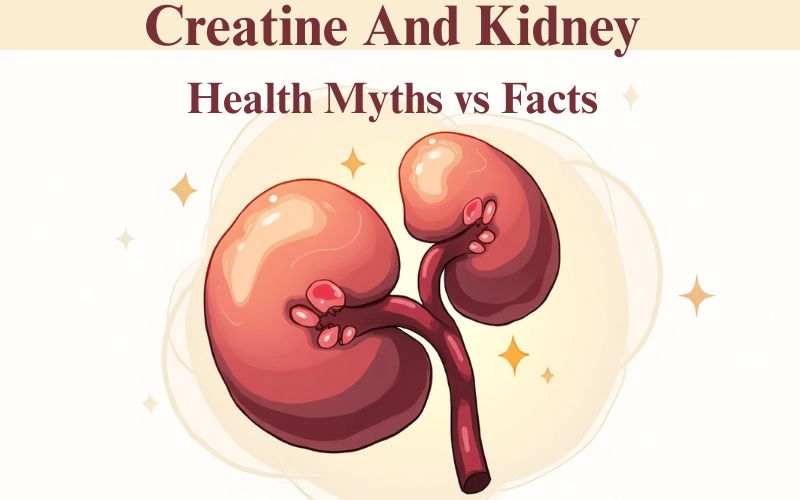Creatine is one of the most researched and widely used supplements in the fitness world. Whether you’re an athlete, bodybuilder, or just someone trying to build muscle, there’s a good chance you’ve heard about or even used creatine. Despite its popularity and proven benefits, there’s still a lot of confusion and concern around one issue: creatine and kidney health.
Many people hesitate to use creatine because of the lingering myth that it damages your kidneys. In this article, we’ll break down the truth about creatine and kidney health by comparing the myths to what science really says. We’ll also discuss how to safely use creatine supplements to protect your health.
Table of Contents
Understanding Creatine: What Does It Do?
Creatine is a compound naturally produced in the body, mostly stored in the muscles, and used to provide quick energy during high-intensity activities. It helps produce ATP (adenosine triphosphate), the energy currency of your cells.
Creatine is also found in foods like red meat and fish, but many people use creatine supplements to increase their levels and enhance performance, muscle strength, and recovery.
The Kidney Damage Myth: Where Did It Come From?
The myth that creatine harms your kidneys likely started because the body breaks creatine down into creatinine, a waste product that is filtered by the kidneys. High levels of creatinine in blood tests can be a sign of kidney dysfunction. So, when people see slightly elevated creatinine levels after taking creatine, they mistakenly assume it’s harming their kidneys.
However, this is a misunderstanding. Elevated creatinine due to creatine supplementation doesn’t necessarily indicate poor kidney function—it simply reflects increased creatine intake and breakdown.
Let’s look at what research actually says.
What the Science Says About Creatine and Kidney Health
Research shows creatine is safe for healthy kidneys when used correctly, with no evidence of damage from standard supplementation.
Long-Term Studies on Healthy Individuals
Numerous clinical studies have examined the impact of long-term creatine use on kidney health in healthy individuals. The consensus is clear: creatine supplements do not harm kidney function when taken at recommended doses.
A 2001 study published in the Journal of Sports Medicine and Physical Fitness found no changes in kidney function after 12 weeks of creatine use in resistance-trained athletes. Another long-term study, published in the European Journal of Applied Physiology, observed no adverse effects on kidney health over a five-year period of consistent creatine use.
Even more recent research in 2020 concluded that creatine has no harmful effect on the kidneys of healthy adults, even with regular supplementation.
Creatine and People with Kidney Conditions
This is where things change slightly. While creatine supplements are safe for healthy people, those with pre-existing kidney disease or impaired kidney function should consult a healthcare provider before using them.
Some doctors may advise against creatine use in individuals with chronic kidney disease simply as a precaution, not because creatine is inherently toxic, but because their kidneys are already under stress.
Addressing the Common Concerns
Elevated Creatinine Levels
Yes, creatine can cause a slight increase in serum creatinine, but this doesn’t mean your kidneys are damaged. It’s a result of how the body processes creatine and is expected when using the supplement.
How to manage it:
- Inform your doctor that you’re taking creatine if you’re getting blood work done.
- Ask for a more specific kidney function test, like a glomerular filtration rate (GFR), which offers a clearer picture of your kidney health.
Dehydration and Kidney Strain
Another myth is that creatine causes dehydration, which in turn can harm your kidneys. The reality is that creatine pulls water into the muscles, but this doesn’t dehydrate your organs. You just need to stay adequately hydrated, especially if you’re active.
How to avoid it:
- Drink plenty of water at least 8 to 10 glasses a day, especially when training.
- Avoid using creatine during extreme heat or intense cardio without proper hydration.
Overuse or Poor-Quality Products
As with any supplement, quality matters. Low-quality or mislabeled creatine products might contain harmful fillers or contaminants.
How to avoid it:
- Choose high-quality, third-party tested creatine supplements from trusted sources like Nutritional World.
- Stick to the recommended dose: 3–5 grams per day for maintenance.
Tips for Using Creatine Safely
If you’re concerned about creatine and kidney health, here are a few tips to ensure you’re using it responsibly:
- Stick to the proper dosage: More is not always better. Use 3–5 grams daily.
- Stay hydrated: Water helps your body process creatine efficiently.
- Choose reputable products: Use pure creatine monohydrate from trusted sources.
- Monitor your health: If you’re getting blood work, inform your doctor about your creatine use.
- Consult a doctor if needed: Especially if you have any history of kidney issues.
Who Should Avoid Creatine?
While creatine is safe for most, the following individuals should consult a doctor before using it:
- People with chronic kidney disease or a history of kidney problems
- Those on medications that affect kidney function
- Pregnant or breastfeeding women (due to lack of research)
- Adolescents without professional guidance
Conclusion
Despite the myths and misinformation, science shows that creatine does not harm kidney health in healthy individuals. The association between creatine supplements and kidney damage is largely based on misunderstanding lab results and anecdotal reports. Numerous studies confirm that when used properly, creatine is one of the safest and most effective supplements available.
If you’re looking to enhance your performance, strength, or recovery, creatine supplements are a reliable choice just make sure you’re using a quality product and following the correct dosage.
Explore premium, tested creatine options at Nutritional World and take a confident step toward achieving your fitness goals with safety and science on your side.
FAQs
- Does creatine damage the kidneys?
No, in healthy individuals, creatine has not been shown to cause any kidney damage. It is one of the most researched supplements available. - Why does creatine increase creatinine levels?
Creatine breaks down into creatinine, which is naturally filtered by the kidneys. Slightly higher levels are normal when supplementing and not a sign of damage. - Can people with kidney disease take creatine?
People with kidney disease should consult their doctor before using creatine. It’s not recommended without medical supervision. - How much water should I drink when taking creatine?
Aim for 8–10 glasses of water daily to support hydration and kidney function, especially during workouts. - Is creatine safe for long-term use?
Yes, research supports the long-term safety of creatine supplements in healthy individuals when taken at recommended doses.


























